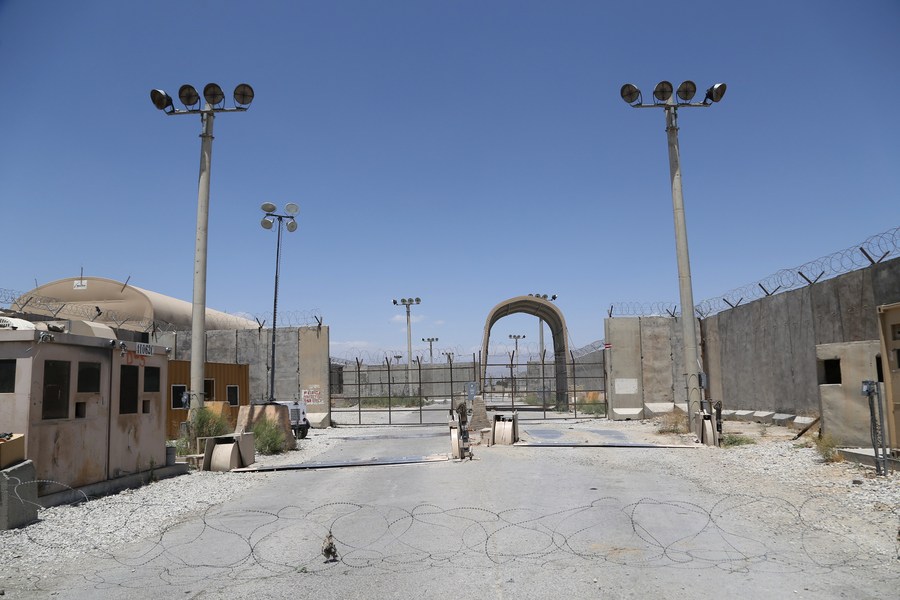U.S. global military presence poses grave security threat to the world
* As critical symbols of American power, U.S. military bases have sprawled all across the world. With large concentrations of facilities in the Middle East, East Asia, parts of Europe, and Africa, the bases are three times as many as all other countries combined, costing U.S. taxpayers an estimated 55 billion dollars annually.
* For decades, the hundreds of military bases have been used by Washington to export ideology-driven wars, subvert governments, and instigate violence and crimes. Since its founding in 1776, the United States has been at war for 93 percent of its existence.
* As Washington becomes increasingly unscrupulous in exporting war and creating scenes of misery and tragedy in other countries, politicians who fan the flames of conflict and embolden the military-industrial complex are the ultimate beneficiaries.
BEIJING, Aug. 25 (Xinhua) -- "Come on! Who is making the most trouble in the world?" U.S. investigative journalist Seymour Hersh asked in a recent media interview.
"Do you know how many (overseas military bases) America has? 800!" the Pulitzer prize-winning journalist exclaimed, revealing that the U.S. government has spent "an unbelievable amount of money" planting and maintaining these bases.
With flowery prose, Washington depicts itself as a champion of world peace and stability. But it is worth asking why such a self-claimed peace lover is so obsessed with projecting its military might and what its 800 overseas military bases -- a startling number -- mean for the world.

Photo taken on July 2, 2021 shows the Bagram Airfield after all U.S. and NATO forces evacuated in Parwan province, eastern Afghanistan. Bagram Airfield had served as a main U.S. and NATO forces base in Afghanistan. (Photo by Sayed Mominzadah/Xinhua)
OUTPOSTS OF U.S. EMPIRE
As critical symbols of American power, U.S. military bases have sprawled all across the world, American writer Mark L. Gillem described in his book America Town: Building the Outposts of Empire, bluntly calling the military bases outposts of the American empire.
Gillem is not exaggerating. In 2017, a U.S. GPS tracking company published a heat map showing where people have used fitness tracking devices. In remote areas and conflict zones in countries like Iraq and Syria, where the heat map became almost entirely dark, there were quite a lot of unusual small lights.
News reports state that zooming in on the spots brings into focus the locations and outlines of known U.S. military bases and other unknown and potentially secret sites, with U.S. military personnel using the fitness devices.
What the heat map exposed is just the tip of a horrific iceberg. In a report published in 2021, the Quincy Institute for Responsible Statecraft, a U.S. think tank, said that the United States maintains around 750 military bases abroad in 80 foreign countries and regions, nearly three times as many as U.S. embassies, consulates and missions worldwide.
According to the report, with large concentrations of facilities in the Middle East, East Asia, parts of Europe, and Africa, the overseas U.S. bases are three times as many as all other countries combined, costing U.S. taxpayers an estimated 55 billion dollars annually.
Data released from the U.S. military indicates that there are 119 base sites in Germany and another 119 in Japan. In South Korea, there are 73. "Other U.S. bases dot the planet from Aruba to Australia, Kenya to Qatar, Romania to Singapore, and beyond," said the report.
As U.S. scholar David Vine demonstrated in his book Base Nation: How U.S. Military Bases Abroad Harm America and the World, more than two decades after the end of the Cold War, the United States still stations its troops in military bases encircling the globe, raising geopolitical tensions and provoking widespread antipathy towards the country.

Police officers hold back protesters who demand the reduction of the U.S. base-hosting burdens and even a total withdrawal of the U.S. forces in Okinawa, Japan, May 15, 2022. (Xinhua/Zhang Xiaoyu)
SOURCE OF WARS, CRIME
For decades, the hundreds of military bases have been used by Washington to export ideology-driven wars, subvert governments, and instigate violence and crimes.
Since its founding in 1776, the United States has been at war for 93 percent of its existence. As U.S. historian Paul Atwood has revealed in his book War and Empire: The American Way of Life, U.S. history is one of constant wars of aggression and imperial expansion, which is the "American way of life."
In a special report in 2019, Smithsonian Magazine found that under the name of anti-terrorism, the United States engaged in military operations in 80 nations on six continents, "more than 40 percent of the world's countries."
In these military operations, overseas military bases were taken as the bridgeheads for the United States to exercise deterrence and direct military intervention.
After the 9/11 terrorist attack, the United States launched the war in Afghanistan, bombing the country for over two months. During the war, the Prince Sultan Air Base operating in Saudi Arabia was the command center for the U.S. military's joint air operations.
Wherever there are military conflicts, U.S. military bases are involved. The New York Times reported that the U.S. military has provided tactical and technical support to the Ukrainian air force at Ramstein Air Base in Germany in the ongoing Ukraine crisis. In June, U.S. President Joe Biden announced plans to build a permanent military base in Poland, further raising regional tensions.
For the ordinary people who live in the host countries, the U.S. military bases have long been the scourge of instability and crime.
In Japan's Okinawa Prefecture, which hosts about 70 percent of U.S. military bases in the country, the U.S. presence has long been a thorn in the flesh of residents through intolerable aircraft noise and criminal acts by military personnel.
According to statistics from the prefecture, from 1972 to 2019, U.S. troops and their families stationed in Japan committed about 6,000 crimes in Okinawa, including robbery, rape and murder.

Civic groups and local residents take to the streets to protest against the U.S. biological labs near a U.S. military base in Busan, South Korea, April 5, 2022. (Photo by James Lee/Xinhua)
In 2021, a South Korean civic group sued the Fort Detrick base and U.S. Forces Korea over smuggled toxic substances into U.S. military bases in the Asian country.
According to the complaint by the Korea Fire Safety Education Culture Association, U.S. Forces Korea and the Fort Detrick bio lab violated South Korean law and imported toxic substances into the country three times between 2017 and 2019.
Vine once surveyed what the United States has achieved with its military bases. He concluded that the bases breed sexual violence, destroy the environment and damage local economies.
BENEFICIARIES BEHIND SCENES
As Washington becomes increasingly unscrupulous in exporting war and creating scenes of misery and tragedy in other countries, politicians who fan the flames of conflict and embolden the military-industrial complex are the ultimate beneficiaries.
It's no secret that U.S. politicians have been playing footsie with the military-industrial complex to make war a lucrative business.

Iraqi protesters take part in a demonstration against the presence of U.S. troops in the country, in Baghdad, capital of Iraq, Jan. 24, 2020. (Xinhua/Khalil Dawood)
In an opinion piece on the U.S. war in Afghanistan, the New York Times admitted that during the 20-year-long Afghan war, "instead of a nation, what we really built were more than 500 military bases -- and the personal fortunes of the people who supplied them."
Official data revealed that only 12 percent of U.S. reconstruction assistance given to Afghanistan between 2002 and 2021 went to the Afghan government. Much of the rest went to companies like the Louis Berger Group, a U.S.-based company.
A study by the Center for Public Integrity found that after donating over half a million dollars to the presidential campaigns of former U.S. President George W. Bush, more than 70 American companies and individuals won up to 8 billion dollars worth of contracts for work in postwar Iraq and Afghanistan.
"They are very happy with their profits," Alfred de Zayas, a former United Nations independent expert on promoting a democratic and equitable international order, said when talking about the reasons behind Washington's war mania.
"With every war we unleash, they bring benefits to them and misery to millions and millions of people," de Zayas lamented.
Photos
Related Stories
- U.S. helicopter targets pro-Iran militia in Syria: monitor
- U.S. GDP in Q2 revised up to 0.6 pct contraction
- U.S. hate crimes rise in 1st half of 2022: data
- Life expectancy falling in U.S.: report
- Less than 20 pct of Gen Z Asian Americans feel accepted in U.S.: The Guardian
- Fauci decries political polarization impeding U.S. COVID-19 response: media
- U.S. durable goods orders in July flat amid drop in defense contracts
- U.S. airstrikes in E. Syria kill 6 fighters: war monitor
- Three-fourths of Americans view gun violence as major problem: poll
- U.S. gunmakers play jobs card amid talk of gun control: Time
Copyright © 2022 People's Daily Online. All Rights Reserved.









